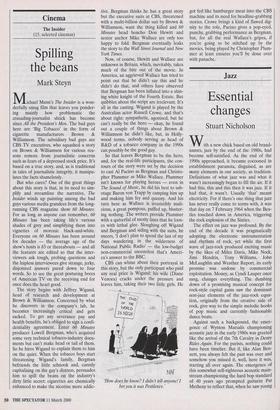Cinema
The Insider
(15, selected cinemas)
Spilling the beans
Mark Steyn
Michael Mann's The Insider is a won- derfully smug film that leaves you ponder- ing mainly how problematic the crusading-journalist shtick has become since All the President's Men. The bad guys here are 'Big Tobacco' in the form of cigarette manufacturers Brown & Williamson. The subsidiary bad guys are CBS TV executives, who squashed a story on Brown & Williamson for various rea- sons remote from journalistic concerns such as fears of a depressed stock price. It's based on a true story, and, as is traditional in tales of journalistic integrity, it manipu- lates the facts shamelessly.
But who cares? One of the great things about this story is that, in its need to sim- plify and streamline the narrative, The Insider winds up painting among the bad guys various media grandees from the long- running CBS magazine show 60 Minutes. For as long as anyone can remember, 60 Minutes has been taking life's various shades of grey and simplifying them into vignettes of moronic black-and-white. Everyone on 60 Minutes has been around for decades — the average age of the show's hosts is 83 or thereabouts — and all the features are edited so that the inter- viewers ask tough, probing questions and the hapless interviewees give strange, jerky, disjointed answers pared down to four words. So to see the great posturing bores of American TV on the receiving end for once does the heart good.
The story begins with Jeffrey Wigand, head of research and development at Brown & Williamson. Concerned by what he discovers in the company's lab, he becomes increasingly critical and gets sacked. To get any severance pay and health benefits, he's obliged to sign a confi- dentiality agreement. Enter 60 Minutes producer Lowell Bergman, who's acquired some very technical tobacco-industry docu- ments but can't make head or tail of them. So he hires Wigand to explain them to him on the quiet. When the tobacco boys start threatening Wigand's family, Bergman befriends the little schnook and, cannily capitalising on the guy's distress, persuades him to spill the beans on the industry's dirty little secret: cigarettes are chemically enhanced to make the nicotine more addic- tive. Bergman thinks he has a great story but the executive suits at CBS, threatened with a multi-billion dollar suit by Brown & Williamson, want the thing killed and 60 Minutes head honcho Don Hewitt and senior anchor Mike Wallace are only too happy to fold. Bergman eventually leaks the story to the Wall Street Journal and New York Times.
Now, of course, Hewitt and Wallace are unknown in Britain, which, inevitably, takes much of the bite out of the movie. In America, an aggrieved Wallace has tried to point out that he didn't say this and he didn't do that, and others have observed that Bergman has been inflated into a shin- ing white knight of the Fourth Estate. But quibbles about the script are irrelevant. It's all in the casting. Wigand is played by the Australian actor Russell Crowe, and that's about right: sympathetic, agonised, but he can't really be the hero — okay, he found out a couple of things about Brown & Williamson he didn't like, but, in Holly- wood terms, nobody serving as head of R&D of a tobacco company in the 1990s can possibly be the good guy.
So that leaves Bergman to be the hero, and, for the real-life participants, the con- tours of the story were set by the decision to cast Al Pacino as Bergman and Christo- pher Plummer as Mike Wallace. Plummer isn't known for playing heroes — even in The Sound of Music, he did his best to sab- otage Baron von Trapp by camping him up and making him fey and queeny. And his turn here as Wallace is irresistibly mali- cious, a great pompous, puffed up, bluster- ing nothing. The writers provide Plummer with a quiverful of snotty lines that he loos- es with lethal glee. Sloughing off Wigand and Bergman and siding with the suits, he sneers, 'I don't plan to spend the last of my days wandering in the wilderness of National Public Radio' — the low-budget non-commercial snoozefest that's Ameri- ca's answer to the BBC.
CBS can whine about their portrayal in this story, but the only participant who paid any real price is Wigand: his wife (Diane Venora) cracks under the pressure and leaves him, taking their two little girls. He `How does he know? I didn't tell anyone! I bet you it was Pestilence.' got fed like hamburger meat into the CBS machine and its need for headline-grabbing stories. Crowe brings a kind of flawed dig- nity to the role, Pacino gives a pop-eyed, punchy, grabbing performance as Bergman, but, for all the real Wallace's gripes, if you're going to be stitched up by the movies, being played by Christopher Plum- mer at least ensures you'll be done over with panache.


































































 Previous page
Previous page